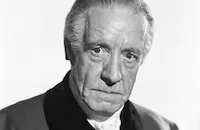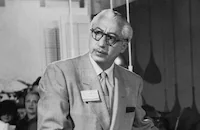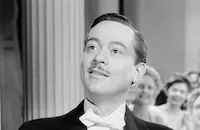Just This Once

Brief Synopsis
Cast & Crew
Don Weis
Janet Leigh
Peter Lawford
Lewis Stone
Marilyn Erskine
Richard Anderson
Film Details
Technical Specs

Synopsis
When New York playboy Mark MacLene accrues $2,000,000 in debt, the executor of his estate, Judge Samuel Coulter, convinces the creditors to let him devise a payback plan that will enable Mark to avoid bankruptcy. Later, as Coulter ponders Mark's situation, he is struck by the frugality of attorney Lucille Duncan, who stubbornly refuses to settle a case for $25, over her client's wishes. Impressed by her words "every dollar counts," Coulter later visits her shared-space office and asks her to administer the "Spencer Clause" of Mark's grandfather's will, which allows for complete management of Mark's estate if it is in jeopardy. Although reluctant, Lucy agrees when Coulter offers her $50 a week. That night, at Mark's house, Coulter tells him of the plan and introduces him to Lucy, who compliments Mark on his antique furnishings. Thinking that the attractive Lucy will be easy to work with, Mark accepts the plan. The next day, all of Mark's bills are forwarded to Lucy, who is shocked at his extravagances. She immediately cancels his charge accounts and returns as much as possible. Just as she is calling to close the account at the florist where Mark bought her flowers, he arrives, asking her to sign a $5,000 check. She refuses, then stuns Mark by saying that he must now get by on $50 a week, and offers to show him where he can get a good lunch for 50 cents. At the automat, Mark is impressed that his sandwich is good, but Lucy is chagrined to learn that he spent $10 tipping a busboy for a window table. A few days later, Lucy thinks that Mark has adapted until Coulter calls to say that he has flown to Paris on his private plane and gone on a spending spree. Rising to the challenge, Lucy tracks Mark down in Hawaii and forces his immediate return when she starts to sell off pieces of his estate. Although Coulter is impressed by Lucy's work, she has second thoughts after realizing that Mark now hates her. With his house now almost bare, Mark decides to show Lucy how it feels to have her life managed and moves into her apartment, invoking the Spencer Clause, which also stipulates that the administrator must provide food and shelter. He explains that money means nothing to him, which is why he spends it, whereas it means everything to her, which is why she tries to keep it. The next evening, when Lucy comes home from work, she finds her apartment newly decorated with things Mark has bought. After eating a gourmet meal, cooked by Mark, the couple is interrupted by Lucy's fiancé, Tom Winters. Tom is not happy to see Mark living in Lucy's apartment, but she assures him that everything is fine. Tom then tells her that he is about to get an $85 a week raise, thus enabling them to marry. Hearing that Tom works for Cosmic Construction, a company he owns, the next day, Mark calls Blackwell, Tom's boss, and orders him to give Tom a $500 a week raise. When Tom tells Lucy of his good fortune, she is suspicious, and upon discovering that Mark owns Cosmic, insists that Tom refuse the raise. Now worried that Mark is changing her life, rather than the other way around, Lucy decides to resign, but Coulter raises her salary to $100 a week. Trying one last time to get Mark to change his spendthrift ways, Lucy suggests to Mark that they spend the day together doing things that are not only fun, but free. He is enthusiastic, even when Tom joins them. As the three spend the day together, Mark and Tom grow to like each other and Mark realizes that Tom loves Lucy very much. At the Empire State Building, Tom gets swept into a different elevator from Mark and Lucy. Although it was not planned, Mark takes advantage of the situation by spending the evening alone with Lucy. He realizes that he is in love with her, and when they get back to her apartment, packs his bag, saying that he must sleep somewhere else. He is about to kiss Lucy when Tom arrives. After Mark leaves, Tom tells Lucy that Mark had earlier offered his yacht and villa for their honeymoon so that they can marry right away. When Tom sees Lucy's reaction, he realizes that she loves Mark, and leaves. The next morning, Mark announces to Coulter that he plans to marry Lucy. When Mark goes to her office, though, she turns down his proposal, saying that she could not respect him if he did not work. Determined to win her over, Mark announces that he will work, and sometime later calls to say that he has put his chemistry degree to use by getting a job in a lab. Lucy excitedly plans a celebration that evening, but Mark cancels because he has to work late. The next day, Mark overwhelms Lucy with boring details of his "exciting" chemistry experiments, even though he is lying. Soon, Lucy realizes what Mark is doing, and when he brings his supposed colleagues to dinner, she exposes the ruse. She throws him out, over his protests that he really does have a job. Finally admitting defeat, the next day, Lucy orders an expensive trousseau. When she visits Coulter, he reveals that Mark, who has been in the Naval Reserve, has just been activated. Lucy then rushes to see Mark's commander and when she finds Mark, throws her arms around him. He tells her not to worry, as he is only being sent to Washington and is being placed in charge of all expenditures for the Navy.

Director
Don Weis
Cast

Janet Leigh

Peter Lawford

Lewis Stone

Marilyn Erskine

Richard Anderson

Douglas Fowley
Hanley Stafford
Henry Slate
Jerry Hausner

Benny Rubin
Charles Watts
Victor Wood
Kate Mackenna
Ida Moore
William "bill" Phillips
Dave Willock
Ann Zika
Emerson Treacy
Bill Welsh
Freeman Lusk
Harry Cheshire
Ned Glass
Robert Foulk
Joseph Mell
John "skins" Miller
John Perri
Clarence Straight
Alvin Greenman
Joann Arnold
Robert Cabal
Robert Stephenson
Helen Winston
William Schallert
Alan Harris
Robert Knapp
Bob Alden
Patrick Conway

Phyllis Kirk
Elizabeth Flournoy
Fred Welch
Steve Wayne
Paul Salata

Jeff Richards

John Eldredge
Virginia Engels
Sam Pierce
Crew
James Basevi
Henry Berman
James Brock
Cedric Gibbons
A. Arnold Gillespie
Keogh Gleason
Sydney Guilaroff
Ray June
George Rhein
David Rose
Douglas Shearer
Sidney Sheldon
Fredrick Y. Smith
Max Trell
William Tuttle
Edwin B. Willis

Photo Collections
Videos
Movie Clip


Film Details
Technical Specs

Articles
Just This Once
By this time, Lawford had patented the role of the spoiled yet charming playboy who needs to be taught to face up to his responsibilities. Leigh is a comely lawyer who takes on that assignment in the film after being hired by a judge (Lewis Stone) who is Lawford's fund trustee and has placed him on a strict budget. The catch is that, in order to closely oversee Lawford's spending, Leigh must move in with him. Despite the fact that she already has a very frugal boyfriend (Richard Anderson), the lawyer finds herself falling for the playboy.
Sheldon, born in Chicago in 1917, had begun in films as a $24-a-week script reader for Universal. He moved on to New York and writing for the stage, and by age 25 had three musical hits running simultaneously on Broadway: The Merry Widow, Jackpot and Dream With Music. He would later, with his collaborators, win a Tony Award for the book of Redhead, starring Gwen Verdon.
Sheldon returned to films with a bang, winning an Oscar® for his screenplay for The Bachelor and the Bobby-Soxer (1947), starring Cary Grant. He has written or contributed to more than 20 film scripts, including such MGM hits as Easter Parade (1948), The Barkleys of Broadway (1949), Annie Get Your Gun (1950) and Dream Wife (1953), which he also directed. He later moved to Paramount, where his screenplays included The Buster Keaton Story (1957), which he also produced and directed.
In addition to his films and his remarkable success as a novelist (18 titles which have sold more than 300 million copies), the prolific Sheldon has written more than 200 TV scripts and created the series I Dream of Jeannie and Hart to Hart. Among movies adapted from his novels are The Other Side of Midnight (1977), Bloodline (1979) and The Naked Face (1984).
Producer: Henry Berman
Director: Don Weis
Screenplay: Sidney Sheldon, from story by Max Trell
Cinematography: Ray June
Art Direction: James Basevi, Cedric Gibbons
Original Music: David Rose
Editing: Fredrick Y. Smith
Principal Cast: Janet Leigh (Lucille Duncan), Peter Lawford (Mark MacLene IV), Lewis Stone (Judge Samuel Coulter), Marilyn Erskine (Gertrude Crome), Richard Anderson (Tom Winters).
BW-91m.
by Roger Fristoe

Just This Once
Quotes
Trivia
Notes
A Hollywood Reporter news item includes Bob Wilkinson in the cast, but his appearance in the released film has not been verified.

Miscellaneous Notes
Released in United States Spring March 1952
Released in United States Spring March 1952













